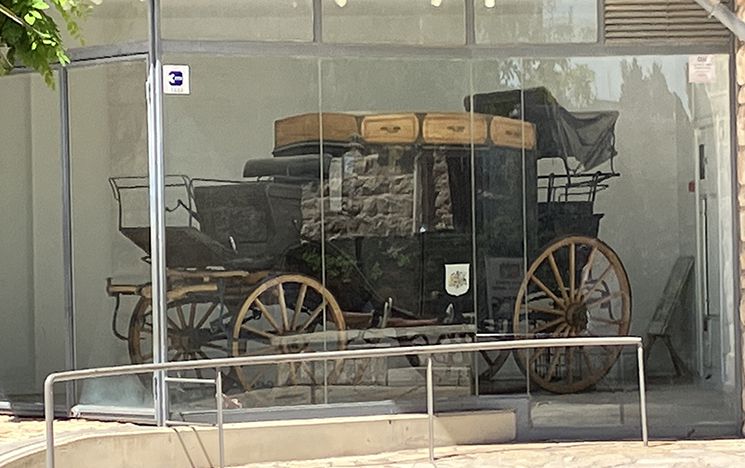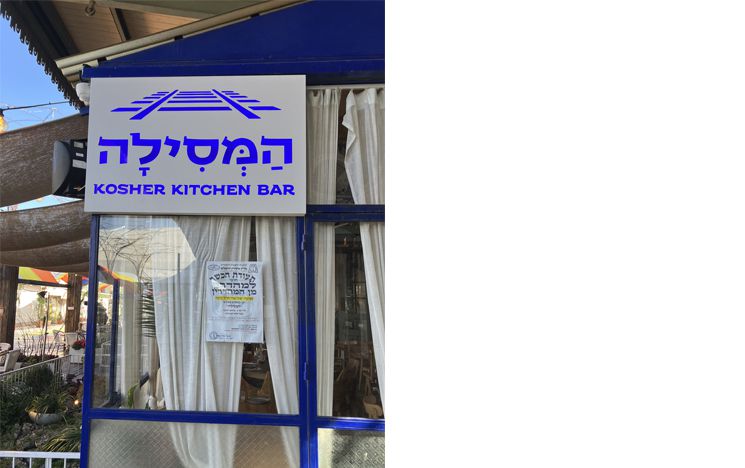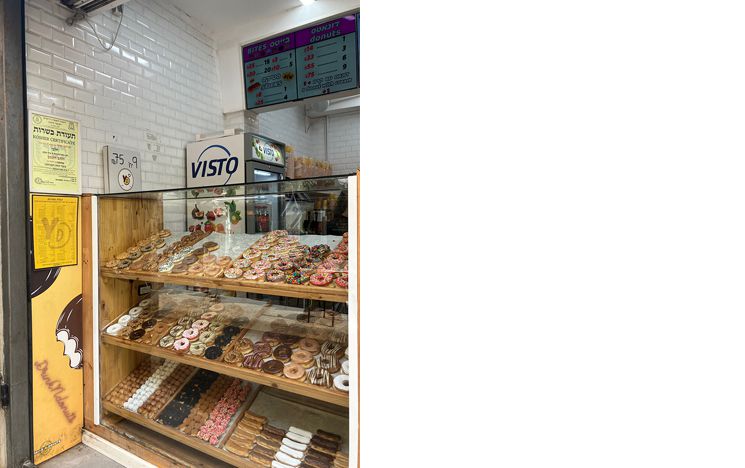Crafting Ethnographic Research between Birmingham and Jerusalem
Superdiversity, Familial Ties, Digital Travel and Kosher Apps
Gabriele Shenar
Pilgrimage has become a big concept, hence research is needed to capture the intricacies of the specific pilgrimage practices, narratives, infrastructures, and itineraries, as they evolve in our increasingly mobile, diverse, digital and interconnected world(s). Thus, the need to employ a mixture of research methodologies and techniques both online and offline becomes ever more important to explain the multi-faceted dimension of pilgrimage. Indeed, digital and archival ethnographies, alongside more traditional ethnographic methods, such as participant observation, enable us to explore and evoke the idea of pilgrimage, both as an academic construct and as a lived reality.
My own project focuses on Anglo-Jewish pilgrimage and tourism to Jerusalem. It explores modern Jewish travel since the famous Sephardi-Jewish philanthropist and campaigner for Jewish emancipation, Moses Montefiore. Despite the perilous, uncomfortable and time-consuming journey he bravely undertook seven separate pilgrimages from England to Jerusalem between 1827-1875. A replica of the horse-drawn carriage which Montefiore used from 1834 onwards is on display in Jerusalem’s Yemin Moshe neighbourhood. It serves as a vivid reminder of how much travel, tourism, as well as accessibility to pilgrimage sites in the Holy Land have changed. A well-known Israeli children’s song, released by Israeli singer Yehoram Gaon in the late 1960s, depicts Montefiore’s famous carriage, paying tribute to his long and productive life and his efforts to help Jews in distress around the world. The song is sometimes played by Israeli tour guides at the site of Montefiore’s mill and carriage in Yemin Moshe which have both become popular tourist and pilgrimage attractions.

Figure 1: Montefiore Carriage, Jerusalem, 2023
Jewish Pilgrimage, Zionism, and Superdiversity
An intrinsic part of my ethnographic research touches on the question of how residents of a superdiverse city such as Birmingham plan, organise, prepare and experience their trips, and how they share their travel experiences and memories with family, friends, their local community, as well as religious, political and cultural associations upon returning home. Seven out of ten Jews in the UK have family in Israel, these familial ties shape and impact itineraries, travel dates and the very experience of Israel as a pilgrimage and tourist destination. Contemporary Jewish pilgrimage and tourism to Israel cannot be fully understood without also considering Zionism both as a political and a religious project, and the ways it is embraced or contested by members of the UK’s Jewish community. An interesting aspect of my research highlights the differing relationships pilgrims, tourists or travellers foster with well-known pilgrimage sites. It largely appears to depend on whether they identify as religiously observant or non-observant Jews. Furthermore, the concept of superdiversity within a city such as Birmingham in relation to places of historical, religious, and cultural significance also impacts the experience individuals have during their pilgrimage or travel. The concept of superdiversity as used in my research denotes not only increased diversity between immigrant and ethnic minority groups but also refers to their internal diversity.
Israel’s Economic Policymaking and Pilgrimage Tourism
Given the reality of our rapidly changing and technology-driven digital societies, pilgrims’ and tourists’ experiences and memories are often shaped by the wider cultural, religious, political, and economic changes taking place in the countries of their respective pilgrimage destination. These debates filter also into local conversations, discussions, and confabulations, aided by modern means of communication. Information is often received via trusted media outlets, the internet, and various social media platforms. Members of the Birmingham and West Midland Jewish Community may not be familiar with the intricacies of Israel’s economic policymaking. Yet, in one or another way they will directly experience the impact Israel’s economic changes from a centralised economy to a privatised, liberalised system in the 1980s have had on the country’s tourism sector. Through various ties with family and friends in Israel, as well as community channels and Jewish newspapers, members of the Jewish community will be informed about the increasing costs of travel to Israel. In the past, this information was obtained from Jewish Community newspapers, such as the Birmingham Jewish Recorder or the Jewish Chronicle, as well as other, more informal, community channels.

Figure 2: Israel Travel ads, Jewish Chronicle, 1967
Digital Travel and Kosher Apps
With the emergence of digital travel and tourism, the internet as well as social media platforms are now increasingly used to organise, manage and experience travel. While Mobile Apps and Web Apps are targeted at a younger tech-savvy generation, the older generations are also embracing digital travel. Jewish travellers may download Kosher Apps such as ‘Kosher GPS’ or ‘cRc Kosher’ that assist them with finding mehadrin kosher (strictly kosher) restaurants, local minyanim (Singular: minyan, quorum of ten Jewish adults required for prayer and other religious obligations) and mikvaot (Singular: mikveh, ritual bath) or aid them with finding out which kosher certifications are recommended. There are various webpages targeted at Jewish travellers that offer advice ranging from getting must-have apps for exploring and navigating Israel to finding suitable vacation rentals and hotels or providing kashrut filters and ratings. Upon arrival, travellers will already have familiarised themselves with Israel’s reusable contactless smart card “Rav-Kav” that can be used to pay for buses, light rail and the national railway. App-users can also be guided to pay for parking, how to call a budget-friendly Taxi, and how to use meal delivery services such as Wolt and TenBis. To remain safe, travellers can also download the ‘Tzofar-Red Alert’ and receive real time alerts of rocket or mortar attacks on the State of Israel.
Jewish Tourism and Mehadrin Kosher
Clearly, the itineraries and accommodation choices of Jewish travellers from Birmingham and other places in the UK will be impacted, in one or another way, by Israel’s recent reform in kashrut (Jewish Dietary Laws) certification, and the growing commercial activity during the Sabbath. The spiking costs of tourist accommodation in Israel may be discussed over Friday dinner or after Shabat Morning service in one of Birmingham’s three synagogues. Religiously observant members of the Jewish community may comment on the even higher costs incurred when booking accommodation in one of Israel’s mehadrin (Considered to be the most stringent level of kosher supervision) kosher hotels. Research has suggested that the rising cost of mehadrin certified kosher hotel accommodation could be explained by the spiralling cost of the Israeli Chief Rabbinate’s kashrut certification. To combat this, some businesses in the hospitality industry have employed the certification of less stringent kashrut agencies such as Tzohar, a moderate religious rabbinical association. Although these kashrut certifications do not display the word ‘kosher’, they are becoming more accepted and recognised as sufficient by some Jewish communities and travellers.
In the face of ever-present business pressures, some Israeli hotels may decide to operate without a kashrut certification, which will be a turn off for religiously observant Jewish pilgrims and tourists. Hotels in Israel spend millions of Shekels every year on koshering their kitchens and some hotels may simply not be able to foot the bill in the future. Clearly, the knock-on effect of increasing hotel prices will especially impact the travel plans of strictly observant Jews who would not consider staying in a non-kosher hotel or visit a restaurant that does not have a mehadrin kosher certificate on display.

Figure 3: Kashrut Mehadrin Certificate Jerusalem First Station 2023
For religiously observant Jews the provision of an operating Shabbat lift will also be an important consideration. A Shabbat lift works automatically to satisfy the Jewish Law that requires Jews to refrain from using or operating electrical appliances that require switching off and on during Shabbat. What these observations on Israel’s kashrut policies show is that Jewish travel to Jerusalem and, more generally, Israel may require specific travel planning. While non-observant, or less strictly observing Jewish tourists and pilgrims may not be overly concerned with levels of kashrut observance, especially because they expect such standards to be met in Israel, they, too, may need to alter or even cancel their travel plans, especially in view of the ever-increasing hotel prices, and the spiking cost of living in Israel. Significantly, the perception of increasing costs for pilgrims and tourists is reflected in statistics published by the World Economic Forum which in July 2023 ranked Israel as the most expensive country in the world for tourists and pilgrims.

Figure 4: Kosher Doughnuts, Jerusalem, 2023